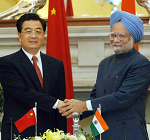China has now clearly emerged as a major world power and India needs to seriously think about how it will engage its neighbour over the twenty-first century. The future of the Sino-Indian relationship will be both competitive and collaborative as the same time. However, the relationship will not be a balanced one. The Chinese are already stronger on almost all fronts.
Moreover, they have systematically built up leverage over decades even when there was no obvious need for it. This means that the Sino-Indian relationship will be played out entirely on China’s terms unless we find ways to push back.
Indian strategists spend too much time trying to understand the immediate motives of the Chinese regime and thinking about specific responses to specific scenarios. This is meaningless when dealing with a country that is thinking in civilizationaltime-frames. Furthermore, the scenarios are themselves endogenous to the relative power equations. There is no point working out various scenarios when the other side is far better placed to dictate the actual sequence of events. It is far better to think in terms of leverage and counter-leverage built out systematically in small incremental steps.
There are four major areas of potential competition/conflict between the two countries.(a) Indian and Chinese exports do not compete much in global markets today. However, we have reason to expect that the two will compete aggressively in future (b) Both countries will compete globally for supplies of commodities and energy (c) Border disputes and the waters of the Brahmaputra (d) Even ignoring its links to Pakistan, China has built up a presence in South Asia that threatens to “encircle” India.
In the short term, India can probably do little more than strengthen military defenses including investment in additional mountain divisions and strategic weapon systems. However, this will be ultimately of no use if China continues to build leverage in all other areas. In the longer term, therefore, India needs to consider a number of measures: (a) India is in a position to exploit its demographic advantage to compete with China’s industrial economy over the next twenty years. Policy tools ranging from the exchange rate to infrastructure should be geared to this end. Urbanization, in some form, is key to mobilizing the hundreds of millions of new workers – we should think of urban design as a strategic tool, (b) Given its inability to secure external energy/resource supplies in the Chinese manner, India needs to strictly conserve its internal mineral and energy resources. Management of the country’s natural resources should be done with a multi-generational perspective, (c) India needs to work harder to improve relations with South Asian countries other than Pakistan. Similarly, it needs to build closer ties with South East Asia, Japan and Korea,(d) India should use “Soft Power” as an active tool for diplomacy. This would include using “Bollywood”, prestigious awards, Diaspora and ancient cultural ties (as in SE Asia) to promote India’s world view.
All these measures require small incremental steps maintained over decades. It is difficult to do this in a country where governments change frequently. This is why we need to create a core group of people who consistently think about these issues and a bi-partisan forum that engages India’s future leadership.
| China and India by Sanjeev Sanyal July 2010.pdf | 687.6 KB |
Sanjeev Sanyal is Founder, Sustainable Planet Institute.
This article was exclusively written for Gateway House: Indian Council on Global Relations. You can read more exclusive content here.
For interview requests with the author, or for permission to republish, please contact outreach@gatewayhouse.in.
© Copyright 2010 Gateway House: Indian Council on Global Relations. All rights reserved. Any unauthorized copying or reproduction is strictly prohibited.


